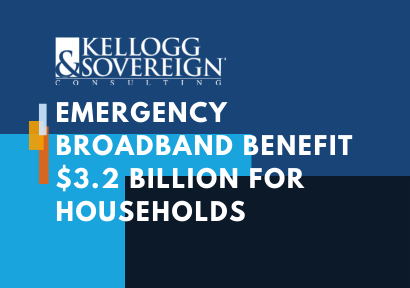By Garima Warma
On July 20, the Federal Communications Commission (FCC) released Order 23-56, which contains a number of proposed changes to the E-Rate program that represent its largest evolution since 2015’s E-Rate Modernization Order. The period for comments from interested parties closed on October 23 and, as a leader in the E-Rate Management Professionals Association (E-MPA), Kellogg & Sovereign (K&S) significantly contributed to the group’s letter of comments to the FCC.
The FCC has stated that the overall goal of the rules changes is to simplify the E-Rate program and make it easier for Tribal libraries to apply, along with expanding eligibility to include Tribal College and University libraries that serve as a public library for their communities.
We welcome the proposed new rules from the FCC and believe that, if implemented with the submitted recommendations, they will be a significant improvement to the E-Rate program. The streamlined process would lead to participants experiencing better access to funding and a reduced administrative burden.

The E-Rate community has been hotly anticipating the new rules for quite some time, with the conversation about updates having begun a few years ago. Many stakeholders have provided feedback during the open period.
From our reading, we believe that the FCC is asking the right questions and we expect a positive outcome from the rulemaking process and this much-needed change.
As part of improving and simplifying the E-Rate application process, the FCC is considering:
• Updating eligible services, including how licensing and software purchase are addressed, what count as duplicative services, and the transition of services between vendors.
• Changing or clarifying the E-Rate competitive bidding requirements, including potential expansion of competitive bidding exemptions, addressing mid-year bandwidth increases, guidance on when competitive bidding must be restarted, and ensuring that the rules recognize Tribal law.
• Streamlining the E-Rate program forms with an EZ Application Form, simplifying the Form 470 drop-down menu options, and modifying or eliminating Form 486.
• Validating discount rates
• Modifying E-Rate invoice and disbursement standards
• Updating E-Rate program definitions
Assuming the proposed changes, with recommendations, all take effect, we expect a number of substantial benefits that participants should be aware of.
We hope that the guidance for cardinal change will be significantly clarified. This will include having allowable changes and what’s not allowed in one location, dramatically simplifying the process, likely leading to a reduction of denials overall. Having everyone working from the same playbook will produce efficiencies for both participants and the FCC.
Under the current rules on duplicative services, multiple service providers are limited. Participants are supposed to only take the most cost-effective provider. However, the FCC is considering the range of technologies that may exist that aren’t truly duplicative or redundant.
For example, the FCC notes that “While redundant circuits would be considered duplicative,” they ask whether there are any unique types of arrangements or network configurations being used that might be needed, and how this need can be documented.
Participants need to look forward to the potential to improve their network technology due to these changes. By getting in place robust backup systems or more modern network configurations, you can reduce network downtime and preserve educational outcomes in the face of nature-related outages or technological issues.
One change that has the potential to increase the total net funding retained by participants is an update to Basic Maintenance. If adopted, Basic Maintenance moving forward will be covered in year one by the FCC, rather than being spread out over as many as two to three years.
This is another area of simplification that provides transparency and will make the E-Rate program more efficient for participants. It’s not uncommon for people to miss applying to receive funds in later years, leading to a loss of those funds. This will be a game-changer. The current rules can be confusing and can make receiving full funding difficult for non-experts. A steady funding stream will help keep budgets balanced and protect participant finances.

We strongly believe that this rule will go into effect when the FCC finalizes.
The FCC should adopt the proposed rules in the next few months. We look forward to the much-needed changes to the E-Rate program, which should take effect in 2024 or 2025. The FCC appears to have listened to the concerns of the community and been responsive to our needs. We hope that in the future we will see similar updates that make cybersecurity allowable under E-Rate.
To learn more about these changes and how they might affect your organization or to gain clarity on E-Rate more broadly, please email us at ContactUs@kelloggllc.com.



